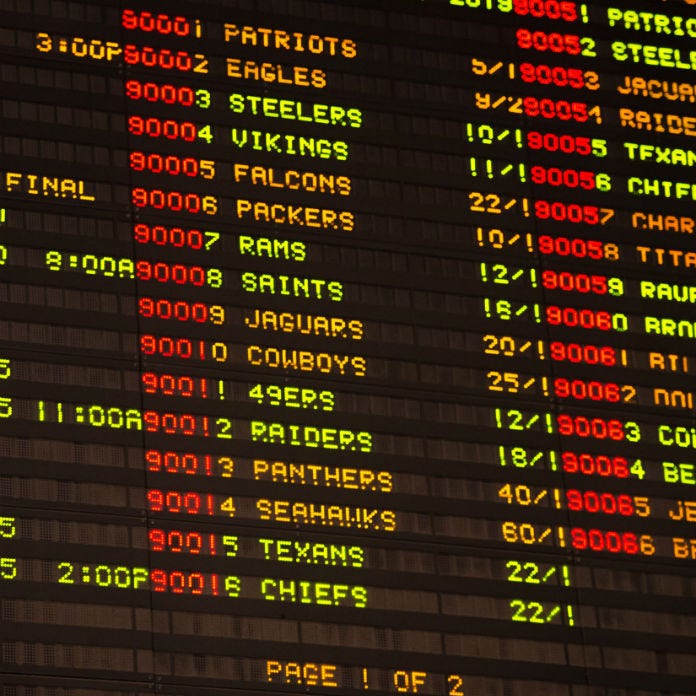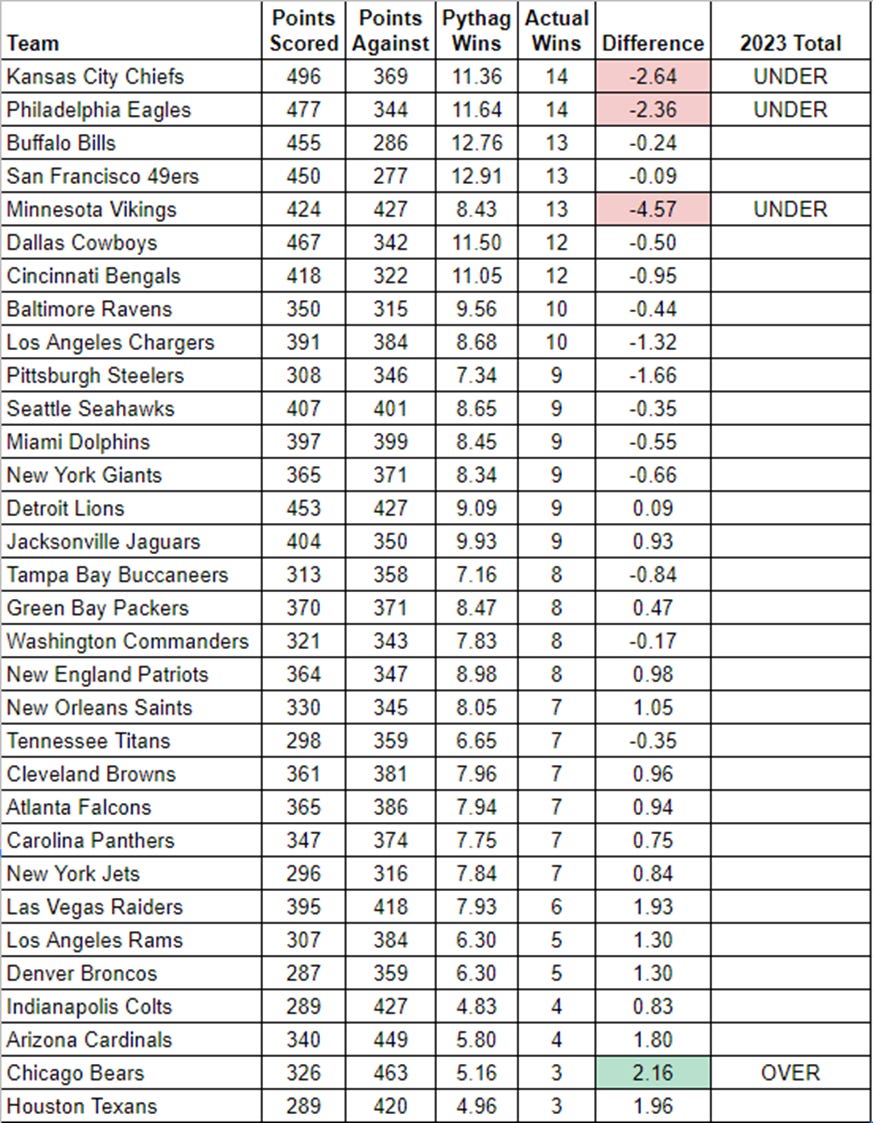Hey golf fans!
Every now and then, there is something in sports betting outside the golf world I feel like I have a good grasp on. Truth be told, I bet on all kinds of sports, golf is just my most competent. Longer-term readers may recall I posted some NBA season long bets back in the fall - for anyone that followed, at least three of the four are looking like easy cashes. It’s a market I have been successful with through the years, so wanted to share picks and hope some followed them.
There is one NFL season long strategy I’ve followed the past few years with great success, so I wanted to have a Friday post about that. I’ll revisit this closer to the NFL season, but you’ll learn below that we can actually find our win total bets well in advance. The principle is called “Pythagorean Expectation”. I know what you are thinking: no, this does not have anything to do with triangles with a right angle.
So What Is It?
Pythagorean Expectation is a sports analytics concept originally developed by Bill James. You might recognize that name as the guy who basically invented ‘sabermetrics’ in baseball. His original concepts have been further developed by future generations, but he’s definitely on the short list of most impactful people in the statistics world.
Through this, Bill was trying to determine the number of games a team should have won based on runs scored and runs allowed. His models were all centered around baseball, but the formula stays true in other sports with slight adjustments. He used this name because the formula resembles the Pythagorean Theorem when it’s written out - it really has no other connection than that.
The equation looks like the below:
The “Sport Exponential” is what varies from sport to sport. Amount of games and relative importance of points is what dictates that number. For NFL, that number is 2.37. You’d then take the formula result and multiply it by the number of games played to come to the ‘expected wins’.
There are of course reasons to be skeptical of treating this like a bible, but broadly it has shown to be very predictive. ‘Garbage-time’ points count the same as all other points in this model, but you’ll find those largely normalize both directions over the course of the season. The goal is not to find an exact win total expectation for the following year, it’s to identify the best options going into next season.
To clarify, we are going to look at last season’s win expectation and use it for next season’s bets. Rosters and situations change, but the trends behind this are strong - if you are still skeptical, I’m going to cover the win percentages of these plays in the next section.
How Do We Use The Results?
When I learned this concept and these trends it was 2021, so all data I am sharing below is from 2011-2020. I have followed the trends to profitable bets every NFL season since learning it.
We’ll ultimately compare a team’s expected wins with their actual wins when we run the numbers. We want to find teams that won or lost 2 or more games than the formula says they should have, in either direction. If they won more than they should have, bet UNDER wins next year; if they lost more than they should have, bet OVER wins next year. Logical enough.
From the timeframe I noted above, when you follow this strategy across the decade, the results are as follows:
Teams with +/- 1 win off expectation - bet wins 59% of the time
Teams with +/- 2 wins off expectation - bet wins 72% of the time
So, we want to focus on the differences of 2 or more. When we segment that into the ‘above’ and ‘below’ buckets even further, we see more guiding data:
Teams that won 6 or less games but should have won at least 2 more - Over bet wins 66% of the time
Teams that won 10 or more games but should have won at least 2 less - Under bet wins 85% of the time
85%! That’s insane. You can use this in many areas, but I’ve focused my bets on the ones that fit the last bullet. Last season, that was the Raiders and Packers - both unders cashed easily. The year before it was the Browns, Chiefs, and Bills - two out of three cashed and I left with profit.
Again, rosters and situations change, but the data is the data. We see overreactions to NFL lines literally every single week; back-up QBs should not move the line 7 points, but the public gets so focused on the position that an edge develops. Think of this as a similar way to see through the noise.
What About This Year?
I ran the 2022 season through the formula, all results below:
These are put in order of wins in 2022. You see columns for the points scored and allowed, which give us the ‘Pythag Wins’ column. I then find the difference between ‘Pythag Wins’ and ‘Actual Wins’, highlighting the results that exceed our 2 game threshold.
We see only one team above who should have won 2 or more games than they actually did last year, the Bears. I don’t usually bet the Overs when I run this, but if I were to, it would be on Chicago next season.
More actionable, we have three teams who should have won less last season: The Chiefs, Eagles, and Vikings. The Chiefs and Eagles played in the Super Bowl of course, but they actually won more games that they likely should have in the regular season. The Vikings were kind of known to be a fake contender this year, so I fully expected them to show up on this list.
Editor’s Note: In my three seasons of running this, I have never seen a team be +/- 4 wins off expectation, a great illustration of how lucky the Vikings got last year.
So How Do We Use This?
We don’t know what the lines will be on ‘Over/Under Regular Season Wins’ right now, there is a ton of offseason to happen still. I understand some of you could be thinking that teams change too much for this to hold much weight, but that niggling thought in your head is why this ends up working. ‘Joe Public-Bettor’ is going to struggle to bet Under on the Chiefs and Eagles. The Eagles have a great draft pick, Chiefs likely add receiver strength - by summer the public is betting on both teams to win 14 games again. Not us.
When lines come out on major books, I advise shopping around for the best totals and odds. We know there are three teams we are interested in betting unders on, so we just shop around for those three. You need to time your bets to maximize the odds - this entails informally betting on what the public will do. I have my thoughts below:
Vikings - bet when lines drop
Chiefs - wait for line to move
Eagles - wait for line to move
We know everyone was aware the Vikings were imposters last season, so I expect others to bet Under there as well. When we see the initial lines drop, we’ll want to act to beat the ensuing line move - this could be better prices or it could be a half game better line if we time our bet properly. Either way, this one is an ‘act now’ bet.
The Eagles and Chiefs are the inverse - books will open their line around 12.5 I expect. There is value in taking that Under, but public bettors will see they won 14 last year, have the same great QB’s, and bet Over on them. That misconception will move the line in our favor. I would wait a month or so after lines open to bet the Under on both of these teams, would really practice watching line movement (a valuable skill in all sports betting, but especially valuable in NFL betting).
Closing Thoughts
I hope no one minds veering outside of the golf world every now and then, it won’t be too regular of thing, only when I have something I know has been profitable over time. Betting ‘Futures’ can be a slippery slope, so I will warn anyone new to it that it’s best to stick to a strategy or limit yourself on the bets you place. When I was newer to betting, I remember getting 20 or more units down on futures - even if you end up a little up, it’s not always viable to have your bankroll locked up for that long.
Realizing this topic might be new to many of you, please do not hesitate to send any questions or feedback my way. I of course did not develop any of what you’ve read here, but have gotten familiar with the concepts as I try to improve myself as a bettor - happy to elaborate on anything in hopes of you improving your betting self as well.
Next week we’ll be back to our regular scheduled golf posts. Until then, best of luck with all your bets.
Matt / Ziggy







Great stuff - thanks for posting!
Great read, thanks for the information 🙏